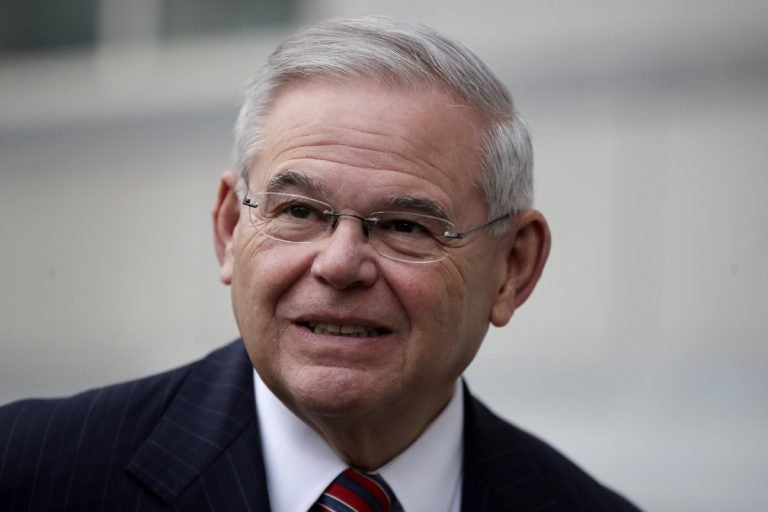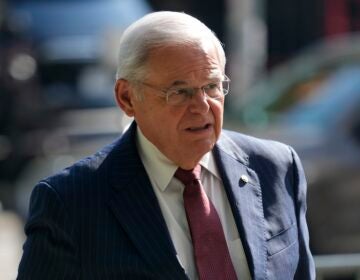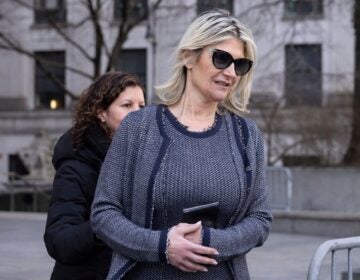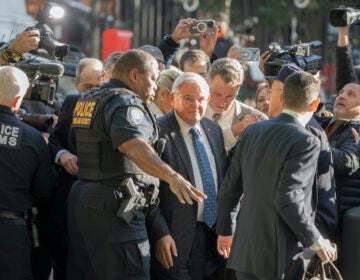Mistrial in Menendez corruption case
Department of Justice prosecutors had accused the New Jersey Democrat and wealthy Florida ophthalmologist Salomon Melgen of engaging in a bribery scheme.
Listen 2:38
U.S. Sen. Bob Menendez (Julio Cortez/AP Photo)
A federal judge in New Jersey declared a mistrial Thursday in the corruption case of U.S. Sen. Bob Menendez.
That decision came after the 12-person jury told the judge for a second time that it was unable to reach a unanimous verdict on any of the bribery, conspiracy, fraud, or false statements charges facing the high-ranking Democrat and his co-defendant.
Outside the federal courthouse in Newark, the mood was celebratory.
“Today is resurrection day,” Menendez told reporters. “I want to thank God, once again, for allowing me to stand before you as I walked into this courthouse 11 weeks ago — an innocent man.”
Earlier, in court, after learning that the case would end in a mistrial, Menendez hugged and kissed his daughter and son. Defense attorneys shook hands and patted each other on the back. Prosecutors huddled.
“I find that you are unable to reach a verdict,” Judge William Walls told the deadlocked jury, around 1 p.m., “and that further deliberations would be futile.”
It is unclear if the government will retry the case.
The judge’s decision closes out the 11-week criminal trial, which was at times tedious, but also rife with tales of ritzy international travel and sizable campaign contributions. It pulled back the curtain on the inner workings of the federal government, as well as the personal life of one of the Senate’s highest-ranking Democrats.
The trial also had national political stakes: If Menendez had been convicted and lost his seat, it could have tipped the political balance of the Senate further toward Republicans and cleared the way for legislation championed by President Donald Trump.
“To those who were digging my political grave so they could jump in my seat, I know who you are,” Menendez said. “And I won’t forget you.”
Even if he had been convicted, Menendez would not have automatically lost his Senate seat. The body would have had to vote by a two-thirds majority to expel him.
The two-term Senator faces re-election next year.
From the outset, Menendez denied any wrongdoing and accused Department of Justice prosecutors of misconstruing a bona fide friendship as a corrupt relationship.
He went even further on Thursday, accusing federal officials of a systematic effort to target him.
“I can’t even begin to tell you how many people have come to tell me that the FBI went to them and asked them, ‘What can you give us on Menendez?’ That is not what the FBI and the Department of Justice is supposed to be doing,” he said.
Reaction from colleagues
In Washington, D.C., Democrats — and even some Republicans — cheered the end of Menendez’s trial.
But Sen. Majority Leader Mitch McConnell called on the Senate Ethics Committee to investigate Menendez, New Jersey’s senior senator.
And South Jersey Republican Tom MacArthur, who has considered challenging Menendez next year, said the outcome is frustrating. “I’m sure everyone wanted a final resolution of this and not a hung jury, but justice grinds at its own pace and in its own way, and it’s nothing I can weigh in on,” said MacArthur.
Justice Department prosecutors had accused Menendez and wealthy Florida ophthalmologist Salomon Melgen, his friend and co-defendant, of engaging in a bribery scheme that lasted seven years, trading gifts and trips for government favors.
Melgen flew Menendez around on his private jet, paid for the senator to travel to Paris and the Dominican Republic, and gave handsome political donations to groups that benefited Menendez.
In return, the government alleged, Menendez helped Melgen secure travel visas for his foreign girlfriends, intervened on the doctor’s behalf in an $8.9 million Medicare overbilling case, and tried to sort out a contract dispute at one of Melgen’s companies in the Dominican Republic.
Both men denied such an agreement ever existed.
The trial came one year after the U.S. Supreme Court overturned the corruption conviction of former Virginia Gov. Bob McDonnell, a Republican, for helping a donor who had given McDonnell gifts.
U.S. Sen. Tim Kaine, D-Virginia, viewed Thursday’s mistrial as an outgrowth of that decision.
“The outcome is not that surprising given the McDonnell ruling, because I think that ruling really did change the way the law was understood,” he said.
Signs of a mistrial
The jury showed signs this week that it would be unable to reach a verdict.
In a note on Monday, jurors told Judge Walls they were deadlocked, only hours into a fresh round of deliberations with an alternate who had replaced a juror excused the previous week.
At the time, Walls told them to go home for the day, eat a good meal and get some rest, and try again in the morning.
They then deliberated all day Tuesday and Wednesday without sending a single note to the court.
On Thursday, the jury sent the second note claiming it was deadlocked.
Prosecutor Peter Koski suggested Walls ask jurors whether they thought they could reach a partial verdict, appearing to hope for a conviction on at least one count. (On top of the corruption charges leveled against both men, Menendez faced an additional count of omitting the gifts from Melgen on his annual financial disclosure forms in the Senate.)
But Walls demurred. “That would be a futile exercise,” he said. “The next thing I know, I am therefore readily criticized for going down this slippery slope of coercion.”
WHYY Washington correspondent Matt Laslo contributed to this story.
WHYY is your source for fact-based, in-depth journalism and information. As a nonprofit organization, we rely on financial support from readers like you. Please give today.




